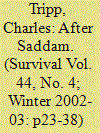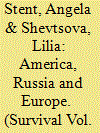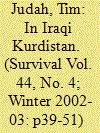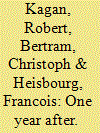|
|
|
Sort Order |
|
|
|
Items / Page
|
|
|
|
|
|
|
| Srl | Item |
| 1 |
ID:
023139


|
|
|
|
|
| Publication |
2002.
|
| Description |
107-120
|
| Summary/Abstract |
The Bush administration's concept of international ‘leadership’ is, in foreign-policy circles, fairly conventional. Leadership means acting, and telling others how to act; it means taking the lead, sometimes alone, and recognising that others will come along once the course seems inevitable. Yet this particular concept contradicts every other theory of leadership in existence. Business-management literature can shed light on relations among states, for the best of this writing on leadership speaks to human nature. In a world where a nascent coalition of like-minded democracies is looking more and more like a true international community, states that aspire to global leadership will, increasingly, need to build consensus on the basis of a shared vision. This perspective strongly reinforces the call for greater multilateralism in US foreign policy.
|
|
|
|
|
|
|
|
|
|
|
|
|
|
|
|
| 2 |
ID:
023134


|
|
|
|
|
| Publication |
2002.
|
| Description |
23-38
|
| Summary/Abstract |
If Saddam Hussein is overthrown by an internal coup, his regime could be succeeded by something similar, albeit with softer edges. A US-led invasion, however, could cause the United States to embark on an ambitious plan for ‘state reconstruction’. In doing so, the stamina of the United States will be severely tested by the resistance of the ‘shadow state’, the lure of communal politics, the indispensability of the security forces and the temptations of massive oil revenues. Faced by regional states determined to play a ‘spoiler’ role, the United States may reduce its exposure and accept much of the status quo in Iraq. Saddam would have gone, but the Iraqis would be left a government little more representative than they have at present.
|
|
|
|
|
|
|
|
|
|
|
|
|
|
|
|
| 3 |
ID:
023140


|
|
|
|
|
| Publication |
2002.
|
| Description |
121-133
|
| Summary/Abstract |
The aftermath of 11 September 2001 has seen the beginnings of a transatlantic realignment. US–Russian relations are increasingly dynamic and US–European relations are increasingly strained. American and Russia have formed an unprecedented partnership. Their shared interest in combating global terrorism, and Putin's own pragmatic and more realistic foreign policy, have opened up new avenues for US–Russian cooperation. At a time when the United States and its traditional European allies are more and more divided over a range of economic and political issues – including complaints about American unilateralism and the conduct of the war on terrorism – America and Russia are increasingly in agreement. The US–Russian partnership has the potential to develop into a broader-based alliance that could ultimately have a positive impact both on Russia's domestic evolution and on European security.
|
|
|
|
|
|
|
|
|
|
|
|
|
|
|
|
| 4 |
ID:
023137


|
|
|
|
|
| Publication |
2002.
|
| Description |
81-97
|
| Summary/Abstract |
New security challenges and the unintended consequences of precision strike have weakened Western deterrence, ‘compellence’ and warfighting capabilities. Democracies face increasing constraints on the use of their overwhelming military might. Contemporary adversaries are undeterred or even inspired by Western superiority. To ensure that military power remains an effective national security instrument, Western civilian and military leaders need to pursue a discriminate force strategy. This will require a paradigm shift in thinking about, preparing for, threatening, or ultimately employing military power. Such a strategy requires innovation in Western doctrine, capabilities, force structure and coalition management. Using force discriminately will reinforce deterrence, bolster diplomatic efforts and increase the effectiveness of military action, should it become necessary.
|
|
|
|
|
|
|
|
|
|
|
|
|
|
|
|
| 5 |
ID:
023135


|
|
|
|
|
| Publication |
2002.
|
| Description |
p39-51
|
| Summary/Abstract |
The Kurdish autonomous region in northern Iraq, created in the wake of the Gulf War in 1991, is abuzz with a sense of foreboding and excitement. There is fear that Saddam Hussein may take his revenge on the Kurds for any US-led attack, and that the Turks could intervene. The Turks fear that any post-war Iraqi Kurdish federal unit will be a stepping stone to eventual independence. Although Kurdish politicians will not say so publicly, they certainly hope that this indeed will be the case. The two main parties have put aside their differences and reconvened the Kurdish parliament. There are also plans to drive out an Islamic fundamentalist group holed up in the mountains, allegedly supported by Iran, Iraq and al-Qaeda. The Kurds may do well out of any US-led offensive on Iraq. If the future Iraq is federal and democratic, the Kurds will have a powerful voice in Baghdad and control of their own affairs – and future generations will be far better placed to achieve the long-term aim of secession and independence.
|
|
|
|
|
|
|
|
|
|
|
|
|
|
|
|
| 6 |
ID:
023136


|
|
|
|
|
| Publication |
Winter 2002-03.
|
| Description |
53-79
|
| Summary/Abstract |
Under the Bush administration's 2002 National Security Strategy document, military pre-emption against ‘rogue states’ and terrorist groups has been elevated to official doctrine. But the conditions under which pre-emption would be undertaken remain unclear. Military action against terrorist groups, such as al-Qaeda, enjoys broad international legitimacy, but that consensus breaks down over the use of force against a state violating non-proliferation norms. A comparative analysis of historical cases reveals force to be as problematic as its non-military alternatives. Inadequate intelligence, concern over collateral damage to civilian populations and the fear of triggering a broader conflict have been major constraints on the use of force to prevent the proliferation of weapons of mass destruction. In the post-11 September era, pre-emption should be a rarely invoked policy option, and successful prevention strategies, employing non-military instruments, might forestall the need to resort to it.
|
|
|
|
|
|
|
|
|
|
|
|
|
|
|
|
| 7 |
ID:
023141


|
|
|
|
|
| Publication |
2002.
|
| Description |
135-156
|
| Summary/Abstract |
In September 2002, one year after the terrorist calamities in New York and Washington, the IISS convened its first ‘Global Strategic Review’ in London. For the meeting's concluding panel, three eminent analysts were asked to assess the prospects for forging a Western ‘grand strategy’ against terrorism and other threats in the new international environment. The panel focused on the nature of US foreign policy and how allies respond to it, and how the US deals with its allies.
|
|
|
|
|
|
|
|
|
|
|
|
|
|
|
|
| 8 |
ID:
023133


|
|
|
|
|
| Publication |
2002.
|
| Description |
p7-22
|
| Summary/Abstract |
The Palestinians face bleak strategic prospects. There is a substantial price to pay for the political misjudgements of the past two years by their leadership. Palestinian statehood has been placed in serious doubt, raising the spectre of new, and increasingly violent and disintegrative, trajectories in the Palestinian–Israeli relationship. This narrows the range of future prospects down to two. Firstly, the conflict will continue until the international community ultimately confronts Sharon (or any like-minded successor) over the nature of the territorial dispensation in the West Bank and East Jerusalem that must be reached if durable Palestinian–Israeli peace is to be attained. Secondly, the conflict will continue until the levels of pain and fatigue in both societies bring about a shift in domestic political balances and force national leaderships to agree the sort of peace deal for which there already is majority support. The cruel irony is that this was attainable in 2000. If the opportunity is missed once more, then the essence of the Palestinian–Israeli conflict will change over the coming decade, from a struggle over the terms of partition to one over the national identity and political nature of Israel.
|
|
|
|
|
|
|
|
|
|
|
|
|
|
|
|
| 9 |
ID:
023138


|
|
|
|
|
| Publication |
2002.
|
| Description |
99-106
|
| Summary/Abstract |
One year after 11 September, two things are certain: America's relations with the rest of the world are undergoing fundamental changes; and America is so powerful that those changes are affecting the international system much more drastically than the terrorist attacks themselves. The Europeans in particular have reacted as much to American reactions to terrorism as they have to the terrorist threat itself. This puts the European Union in a difficult position; it must proceed with the daunting project of enlargement, based on the logic of peacetime prosperity and integration, in a new international context of crisis and renewed attention to national sovereignty. A conservative attachment to an unchanged NATO is not the answer, for NATO itself must adapt to a United States that is becoming more unilateralist, more militarist and less interested in its European alliance.
|
|
|
|
|
|
|
|
|
|
|
|
|
|
|
|
|
|
|
|
|